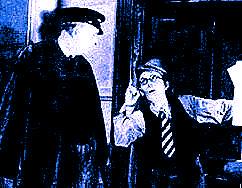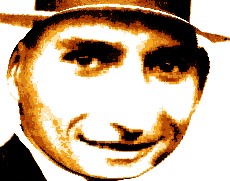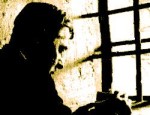Film Review
Arnold Ridley's play
The Ghost Train
has surfaced in many guises since its original stage production in the
mid-1920s. The first film version was made in 1927 at UFA
studies in Germany (with a British cast and crew). The 1931
British film version (which starred popular comic actor Jack Hulbert)
no longer exists in its entirety and has been overshadowed by this more
dramatic 1941 version, which provided a suitable comedy vehicle for the
popular music hall comic Arthur Askey. Will Hay's comedy
Oh, Mr. Porter! (1937) is also
loosely based on Ridley's play. In addition, there have been
radio adaptations and in 1937 the BBC transmitted a television version
(one of the corporation's first broadcast TV dramas). And yes, in
case you are wondering, this is the same Arnold Ridley who would later
play the loveable Private Godfrey in the BBC TV series
Dad's Army.
This 1941 film version is perhaps the best known adaptation of Ridley's
play. An atmospheric piece which tapped into contemporary fears
of Nazi invasion, the film effectively combines comedy and thriller
suspense, benefiting from an enjoyably eccentric ensemble cast and
well-honed screenplay. Arthur Askey's presence is both a curse
and a blessing - he lightens the mood and heightens the intrigue by
appearing slightly sinister, but his relentless attempts at humour soon
become tiresome (to put it mildly).
The film's main failing is that Askey looks as if he is doing a one-man
show. The story and the other characters end up being shunted
down a siding, so that Askey can take centre-stage and regale us with
his face pulling, pratfalls and seriously toe-curling jokes. It
does not help that his character is an unsympathetic nuisance who
spends most of his time winding up all of the other protagonists.
The brooding atmosphere and some pleasing Hitchcockian touches in the
final act at least go some way to compensate for this surfeit of
Askey-themed humour, but you really have to be a die-hard Arthur Askey
fan to love this film.
© James Travers 2010
The above content is owned by frenchfilms.org and must not be copied.
Film Synopsis
When a party of rail passengers bound for Cornwall miss their
connection they find themselves stranded at a railway station, four
miles from the nearest village. The next train is not due until
the following morning and there is no other means of transportation.
The station master is insistent that the passengers leave and try to
find overnight accommodation in the village, but they refuse to move,
since it is raining heavily. Before he goes home, the station
master leaves with a dire warning. The station is haunted, and
has been for the last 43 years, since that awful day when a train fell
from an open bridge and plunged into the river, killing all on
board. Every night, a ghost train passes through the station,
bringing death to anyone who dares to look at it. Naturally, the
travellers react to this fanciful story with derision and
disbelief. But they soon discover there may in fact be some truth
in it. The ghost train is already on it way...
© James Travers
The above content is owned by frenchfilms.org and must not be copied.



